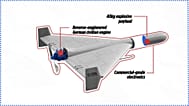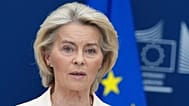Brussels is to seek deeper integration with the bloc's southern neighbours, through a new "Pact for the Mediterranean" presented on Thursday.
The European Commission presented on Thursday a new "pact for the Mediterranean" aimed at reshaping relations with Southern Neighbourhood countries amid growing global instability.
 ADVERTISEMENT
ADVERTISEMENT
 ADVERTISEMENT
ADVERTISEMENT
The pact includes several projects to be developed in 10 Mediterranean countries that touch key sectors for the EU.
"We want to strengthen this relationship and achieve deeper integration within the Common Mediterranean Space," the document of the deal reads.
"The aim of the pact is to bring about a paradigm shift, which is necessary to realise the full potential of our partnership and to work together based on the principles of co-ownership, co-creation and joint responsibility," it continues.
The document highlights trade integration, migration, and border management, as well as the region’s growing role in the EU supply chain for agriculture, fertilisers and critical raw materials.
It also refers to projects on decarbonisation, climate change mitigation, renewable energy, water scarcity, disaster preparedness, private sector investment, digitalisation and AI, and initiatives to establish a Mediterranean university and promote education and cultural exchange.
The pact concerns Algeria, Egypt, Israel, Jordan, Lebanon, Libya, Morocco, Palestine, Tunisia and Syria.
However, a space for involvement in the deal's projects is left open for Gulf partners, Mauritania, Senegal, Turkey, the Western Balkans and partners from the Black Sea.
A different approach?
During the press conference, the European Commissioner for the Mediterranean Dubravka Šuica said that this time Brussels is showing a different tack to its partners across the sea.
"We have a bottom-up approach, we consulted with everyone on the ground from different part of the society, not only with governments. We underlined that we are creating partnerships among equals," Šuica said during the press conference.
This was criticised by representatives of civil society, who said that the pact had a "limited" consultation process.
NGO EuroMed Rights Vice-President Moataz El Fegiery said that "the publication of the Pact was preceded by a consultation process, a limited one as many of the victims of repression by regimes in the region were not heard."
"The clear focus on investment and trade and the absence of any reference to democratic reforms, as was the case, for example, with the Barcelona Process, risk favouring state-to-state cooperation in the implementation of the pact".
The Barcelona Process was an initiative launched in 1995 as a framework for cooperation between the EU and countries around the Mediterranean region.
Despite several proposals to integrate the region at the time, no politically tangible results had been achieved.
During the press conference on Thursday, the question of how Brussels will compete with major world actors with a strong presence in Mediterranean countries, such as China and Russia, EU foreign policy chief Kaja Kallas said the EU "is contributing positively by promoting an equal partnership."
“We need to be credible and reliable if we want to remain competitive,” Kallas said.
Regarding Moscow's influence in the region, Kallas said the EU is "raising the issue of Russia," urging partners not to circumvent sanctions.














